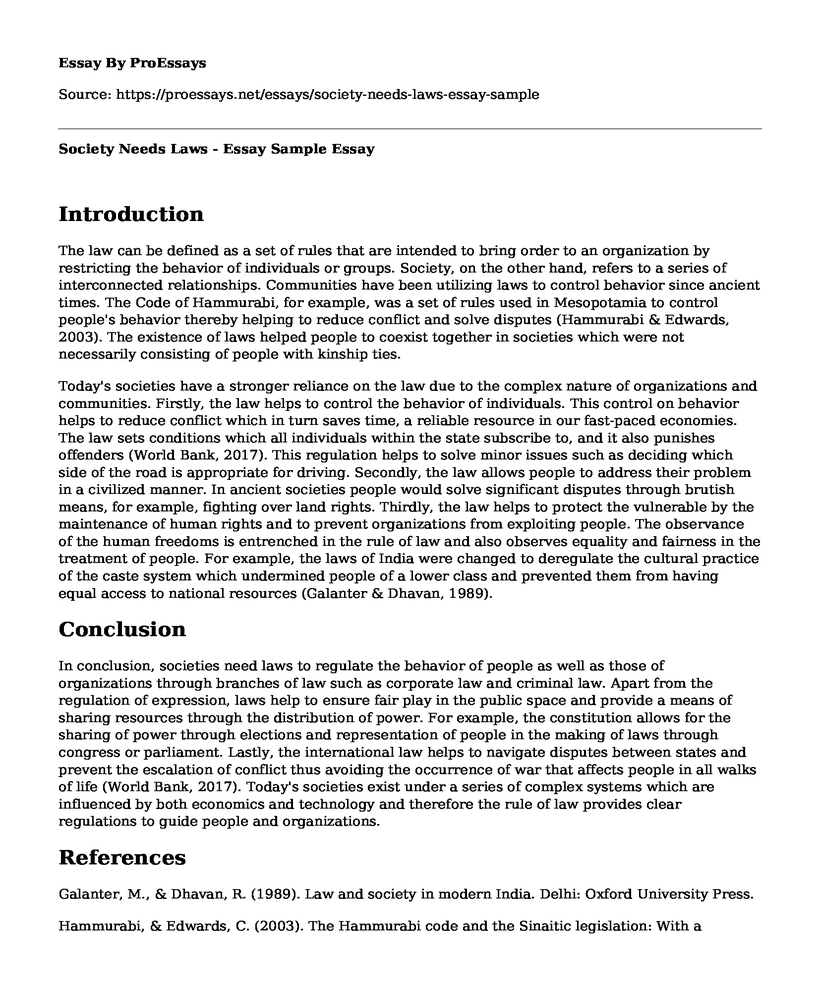Introduction
The law can be defined as a set of rules that are intended to bring order to an organization by restricting the behavior of individuals or groups. Society, on the other hand, refers to a series of interconnected relationships. Communities have been utilizing laws to control behavior since ancient times. The Code of Hammurabi, for example, was a set of rules used in Mesopotamia to control people's behavior thereby helping to reduce conflict and solve disputes (Hammurabi & Edwards, 2003). The existence of laws helped people to coexist together in societies which were not necessarily consisting of people with kinship ties.
Today's societies have a stronger reliance on the law due to the complex nature of organizations and communities. Firstly, the law helps to control the behavior of individuals. This control on behavior helps to reduce conflict which in turn saves time, a reliable resource in our fast-paced economies. The law sets conditions which all individuals within the state subscribe to, and it also punishes offenders (World Bank, 2017). This regulation helps to solve minor issues such as deciding which side of the road is appropriate for driving. Secondly, the law allows people to address their problem in a civilized manner. In ancient societies people would solve significant disputes through brutish means, for example, fighting over land rights. Thirdly, the law helps to protect the vulnerable by the maintenance of human rights and to prevent organizations from exploiting people. The observance of the human freedoms is entrenched in the rule of law and also observes equality and fairness in the treatment of people. For example, the laws of India were changed to deregulate the cultural practice of the caste system which undermined people of a lower class and prevented them from having equal access to national resources (Galanter & Dhavan, 1989).
Conclusion
In conclusion, societies need laws to regulate the behavior of people as well as those of organizations through branches of law such as corporate law and criminal law. Apart from the regulation of expression, laws help to ensure fair play in the public space and provide a means of sharing resources through the distribution of power. For example, the constitution allows for the sharing of power through elections and representation of people in the making of laws through congress or parliament. Lastly, the international law helps to navigate disputes between states and prevent the escalation of conflict thus avoiding the occurrence of war that affects people in all walks of life (World Bank, 2017). Today's societies exist under a series of complex systems which are influenced by both economics and technology and therefore the rule of law provides clear regulations to guide people and organizations.
References
Galanter, M., & Dhavan, R. (1989). Law and society in modern India. Delhi: Oxford University Press.
Hammurabi, & Edwards, C. (2003). The Hammurabi code and the Sinaitic legislation: With a complete translation of the great Babylonian inscription discovered at Susa.
World Bank. (2017). The Role of Law. World Development Report, 83-97.
Cite this page
Society Needs Laws - Essay Sample. (2022, Aug 12). Retrieved from https://proessays.net/essays/society-needs-laws-essay-sample
If you are the original author of this essay and no longer wish to have it published on the ProEssays website, please click below to request its removal:
- Mobile Phone Forensics - Example of Writing Assignment
- Cyrus the Great and the Cyrus Cylinder Essay
- National Crime Victims Survey Analysis Paper Example
- Forensic Psychology Annotated Bibliography
- Gaps in Programming for Couples Essay Example
- Essay Example on Sonny's Blues: Music, Race, Suffering, and Hope
- Essay Example on Martin Luther King Jr.: A Civil Rights Hero for Equality







